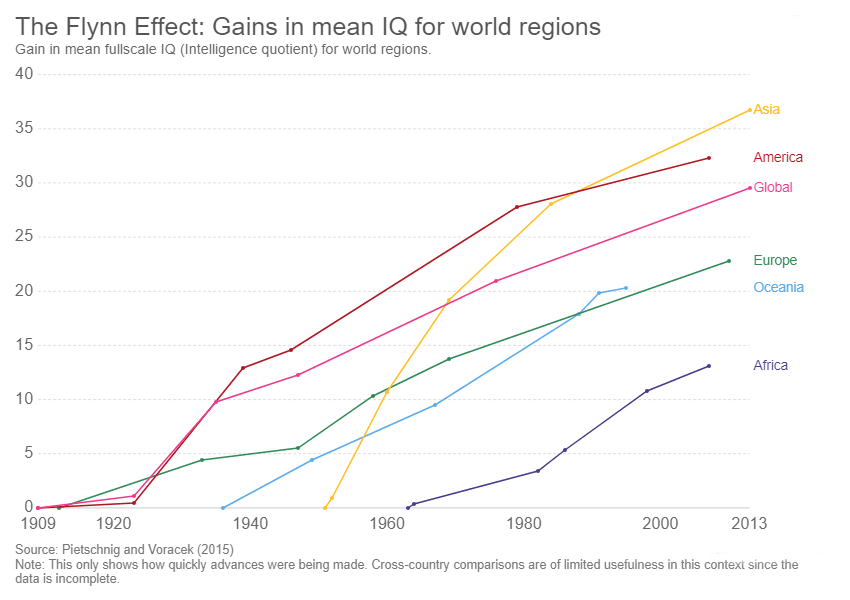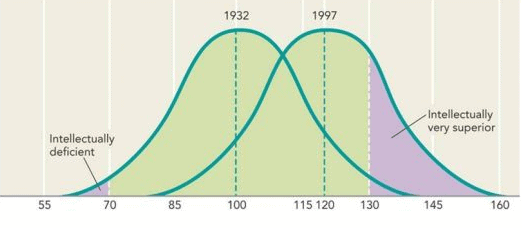Have you gotten more intelligent over the course of your life?
For years, the best way to measure someone’s intelligence has been to give them an IQ test. IQ tests were first developed in the early 1900s. These tests come in many forms, but they all attempt to measure someone’s intelligence compared to other people within the same age bracket. As you get older, you should perform better on these tests. After all, you’ve acquired more knowledge and experienced the world more.
But there is a strange phenomenon within IQ tests. Sure, individuals can become smarter over time. But what happens if we look at the whole population? That’s what one psychologist set out to do. His findings are now known as “The Flynn Effect.”
What is the Flynn Effect?
The Flynn Effect theorizes the average IQ score of 100 represents different levels of intelligence throughout time. This is because, James Flynn believes, intelligence among humans has risen throughout history due to factors like better education and a higher quality of life.
Example of the Flynn Effect
For example, if you took an IQ test in 1800, you might score 80, but if you took one today, you might score 100.
When Was the Flynn Effect Discovered?
In the 1980s, James Flynn began to look at what IQ scores said about the general population. As he continued his research, he noticed a phenomenal trend. IQ scores didn’t just increase as an individual ages. The overall IQ score for the population increased over time. This increase averaged to about .31 per year.
This may not seem like much, but that is an astounding 30 points per decade. The difference between an IQ of 110 and 140 is significant. (140 is the IQ in which someone is considered a “genius.” 100 is considered “average.”)
Flynn’s work, and the work that has supported it, haven’t just looked at one IQ test. Tests like the Stanford-Binet and Wechsler were considered. In other developing nations, tests like the Raven's Progressive Matrices test were taken into account. While exact increases vary throughout the world, the general consensus is that IQ scores have increased over the course of the 20th century.

Why Has IQ Changed Over Time?
The data has shown us that the general population has likely become significantly more intelligent over time. But there is no one answer that suggests why the Flynn Effect has occurred. Some theories are based on studies that show how IQ can be affected:
- Education: With more access to education, and a higher quality of education, the world may become more intelligent.
- Nutrition: Better access to high-quality nutrition can also impact IQ.
- Less infectious disease: Health in general can impact a person’s education, well-being, and intelligence. With better healthcare and fewer infectious diseases, people could have more time and energy to learn. (Studies around the global pandemic could show how correct or off-base this theory really is!)
- More stimulation: Another theory has to do with how knowledge has been exchanged. We are in the Information Age. With more access to information, it would make sense that our intelligence would rise.
- Overall quality of life: All of these factors could have an impact on IQ (and on each other!) Researchers in 1998 found that general socioenvironmental factors had a significant impact on IQ scores in developing countries.
Although evolution and sexual selection may appear to play into this effect, research on the Flynn Effect has pointed to more environmental factors.
James Flynn himself has some theories about why IQ has risen. The world has become more complex, forcing us to solve more complex problems. Our education has focused more on abstract problems and hypothetical situations. He also says that in 1900, 3% of Americans practiced a “cognitively demanding” job. Nowadays, that number is up to 35%. This is because these jobs are more valued and more of them are available. (There were no software engineers as we know them today in 1900!)

You can hear James Flynn talk more about why the world has become “smarter” in his TED Talk from 2013.
Is the Flynn Effect Still Happening?
James Flynn studied IQ tests in the 1980s. How have we fared since then?
Many researchers say that we’ve hit a plateau, or possibly a peak. A number of developed nations have reported that IQ scores have actually gone down in the last 20 years. In 2005, for example, Teasdale and Owen published a study that showed a decrease in IQ scores among Danish men. One of the interesting things about this study is the explanation for why this could have occurred. Studies show that Danish educators have begun to shift their strategies to focus on more practical knowledge. Enrollment at higher universities has declined. Could James Flynn be correct? Is abstract knowledge the key to increasing IQ score and making us “smarter? And what does that mean for the population?
Why Is The Flynn Effect Important?
Why is it so important to look at IQ scores? Since IQ tests have been chosen as the “standard” way of measuring intelligence, their results have made a big impact on society and education.
For example, the Flynn Effect could suggest that current education strategies are working. The more modern methods of teaching children may be continued for this reason. IQ scores also make an impact on what children are considered “gifted” and which ones have an “intellectual disability.” If IQ scores continue to rise, will this gap continue to rise as well? Where should educators draw the line?
Outside of education, IQ tests can also have an impact on who is considered to be intellectually disabled. This classification is considered when distributing government benefits or even issuing capital punishment. On the other side, people with an exceptionally high IQ may be let into certain societies - but if everyone’s IQ continues to rise, are these groups going to become less exclusive?
IQ Tests Themselves Have Evolved
In order to dive deep into the results of the Flynn Effect, we must trust in the tests that are measuring intelligence. Unfortunately, those tests aren’t as solid as we may think.

Flynn himself has theorized that while IQ tests can’t directly measure “intelligence,” they can measure skills that contribute to a person’s intelligence. While our education system and quality of life has appeared to evolve, so has the IQ test itself. Many versions of the IQ test have been produced since 1904. These adaptations have attempted to account for cultural differences and biases that could impact whether someone is truly intelligent.
There is still more data to analyze and work to be done in order to secure our trust in the IQ test and the factors that make us more “intelligent.” But if the Flynn Effect has anything to say about it, we’re doing a pretty good job of developing as a world at large.


